榆林育才中学高中英语Unit4Sharing语法导学案新人教选修7
高中英语 Unit 4 Sharing 语法导学案 新人教版选修7

高中英语 Unit 4 Sharing 语法导学案新人教版选修7Unit4 Sharing 语法导学案新人教版选修7教学目标:1、复习定语从句(The attributive clause)2、正确使用关系代词和关系副词课前练习1、Fill in the blanks using that / which / whose1、This is the ship _________ name is also Titanic 、2、Titanic is the ship _______________ sank after hitting an iceberg in1894、3、Titanic is the ship ______________ a terrible disaster happened to、4、Titanic is the ship to___________ a terrible disaster happened、2、 Combine each pair of sentences using when / where、I was born in Shanghai、 Shanghai is a beautiful city、Shanghai,______/________ I was born, is a beautiful city、I still remember the day、 I first came to the school on the day、I still remember the day _______/__________I first came to the school、自主学习定语从句一般都紧跟在它所修饰的词后面。
被定语从句所修饰的名词或代词叫做“先行词”。
引导定语从句的词叫“关系词”。
关系词有两个作用:1、引导定语从句。
2、代替先行词在其引导的定语从句中充当一定的句子成分。
新人教版 高中英语 选修7 精品导学案 英语:Unit 4 Sharing 学案
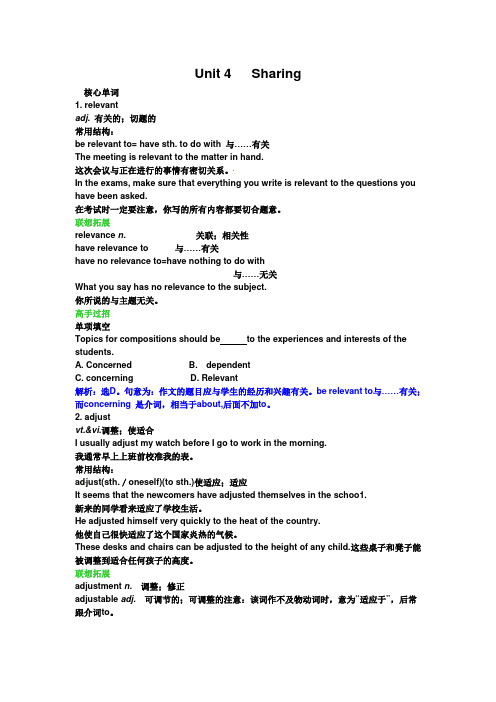
Unit 4 Sharing核心单词1. relevantadj.有关的;切题的常用结构:be relevant to= have sth. to do with 与……有关The meeting is relevant to the matter in hand.这次会议与正在进行的事情有密切关系。
In the exams, make sure that everything you write is relevant to the questions you have been asked.在考试时一定要注意,你写的所有内容都要切合题意。
联想拓展relevance n.关联;相关性have relevance to 与……有关have no relevance to=have nothing to do with与……无关What you say has no relevance to the subject.你所说的与主题无关。
高手过招单项填空Topics for compositions should be to the experiences and interests of the students.A. ConcernedB. dependentC. concerningD. Relevant解析:选D。
句意为:作文的题目应与学生的经历和兴趣有关。
be relevant to与……有关;而concerning 是介词,相当于about,后面不加to。
2. adjustvt.&vi.调整;使适合I usually adjust my watch before I go to work in the morning.我通常早上上班前校准我的表。
常用结构:adjust(sth./oneself)(to sth.)使适应;适应It seems that the newcomers have adjusted themselves in the schoo1.新来的同学看来适应了学校生活。
高中英语 Unit 4 Sharing Reading导学案(教师版)新人教版选修7
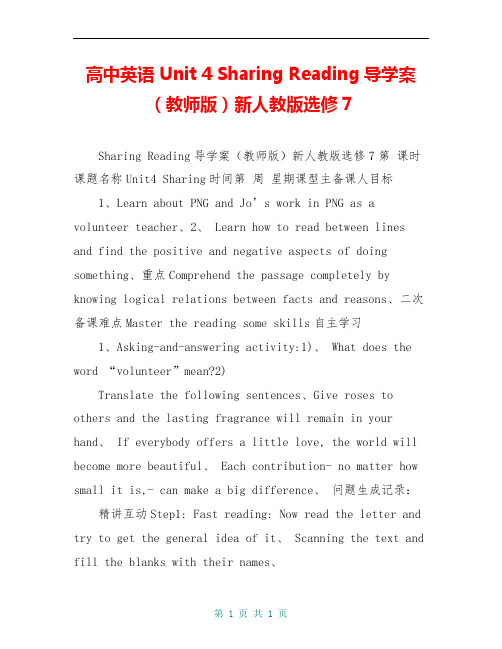
高中英语 Unit 4 Sharing Reading导学案(教师版)新人教版选修7Sharing Reading导学案(教师版)新人教版选修7第课时课题名称Unit4 Sharing时间第周星期课型主备课人目标1、Learn about PNG and Jo’s work in PNG as a volunteer teacher、2、 Learn how to read between lines and find the positive and negative aspects of doing something、重点Comprehend the passage completely by knowing logical relations between facts and reasons、二次备课难点Master the reading some skills自主学习1、Asking-and-answering activity:1)、 What does the word “volunteer”mean?2)Translate the following sentences、Give roses to others and the lasting fragrance will remain in your hand、 If everybody offers a little love, the world will become more beautiful、 Each contribution- no matter how small it is,- can make a big difference、问题生成记录:精讲互动Step1: Fast reading: Now read the letter and try to get the general idea of it、 Scanning the text and fill the blanks with their names、1、__ _____ _ is a young Australian woman、2、__ ___ _ was dying to hear all about Jo’s life in PNG、3、 walked a long way to get to school、4、 did n’t have any textbook、5、 became a lot more imaginative when teaching、6、 started jumping out the windows during a chemistry experiment、7、 visited a village that was the home of one of the boys, Tombe、8、started crying “ieee ieee” to welcome them、9、 led us to a low bamboo hut、10、 was going to share the platform with Jenny and Jo、11、softly talked to each other in their language Jo didn’t understandStep2: Careful reading: Now you’re to read the passage carefully to complete the tables below! Table1 (about the school)Conditions Our schoolThe school described in the letterClassrooms(equipped ornot)Students’ futureElectricity andwater(Y/N)Textbook(Y/N)Chemistry experiments(many/few)Table2 (about the life in the village)Types of housesDietFamily relationshipsPossessionsCookingmethodsAgricultureSleeping arrangementsBeliefs达标训练根据课文内容完成下列短文填空。
榆林育才中学高中英语Unit4Sharing语言知识导学案新人教选修7
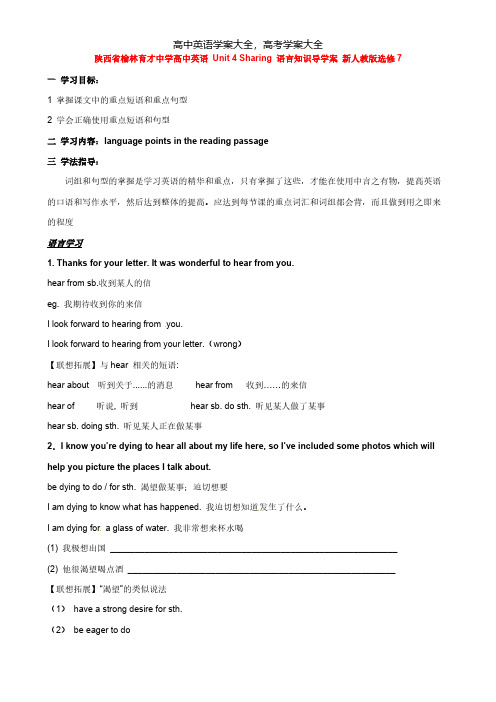
陕西省榆林育才中学高中英语Unit 4 Sharing 语言知识导学案新人教版选修7一学习目标:1 掌握课文中的重点短语和重点句型2 学会正确使用重点短语和句型二学习内容:language points in the reading passage三学法指导:词组和句型的掌握是学习英语的精华和重点,只有掌握了这些,才能在使用中言之有物,提高英语的口语和写作水平,然后达到整体的提高。
应达到每节课的重点词汇和词组都会背,而且做到用之即来的程度语言学习1. Thanks for your letter. It was wonderful to hear from you.hear from sb.收到某人的信eg. 我期待收到你的来信I look forward to hearing from you.I look forward to hearing from your letter.(wrong)【联想拓展】与hear 相关的短语:hear about 听到关于......的消息hear from 收到……的来信hear of 听说, 听到hear sb. do sth. 听见某人做了某事hear sb. doing sth. 听见某人正在做某事2.I know you’re dying to hear all about my life here, so I’ve included some photos which will help you picture the places I talk about.be dying to do / for sth. 渴望做某事;迫切想要I am dying to know what has happened. 我迫切想知道发生了什么。
I am dying for a glass of water. 我非常想来杯水喝(1) 我极想出国___________________________________________________________(2) 他很渴望喝点酒_______________________________________________________【联想拓展】“渴望”的类似说法(1)have a strong desire for sth.(2)be eager to do(3)be thirsty for sth.(4)desire to do sth.(5)long to do sth. / for sth.单项选择:Smallpox(天花), a kind of disease, has now died______. .A. outB. awayC. offD. down3. Sometimes I wonder how relevant chemistry is to these students, most of whom will be going back to their villages after Year 8 anyway.relevant adj. 有关的,相关的;切题的What you said is not relevant to the matter in hand.你所说的事与目前考虑中的问题无关。
2019-2020年高中英语 Unit 4 Sharing语法课教案 新人教版选修7
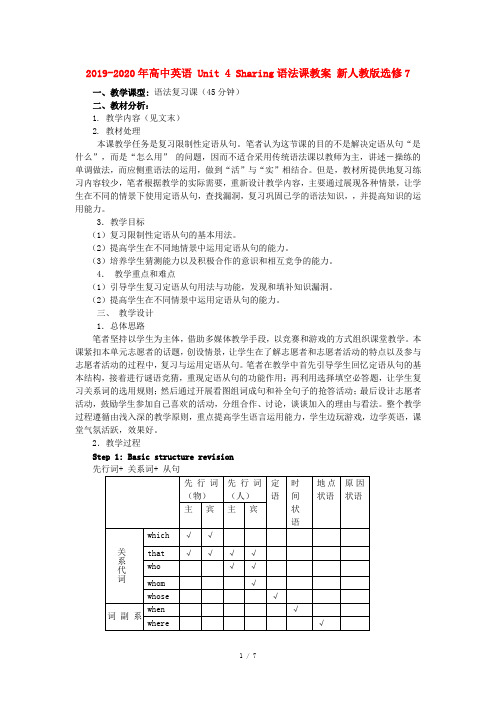
2019-2020年高中英语 Unit 4 Sharing语法课教案新人教版选修7一、教学课型:语法复习课(45分钟)二、教材分析:1. 教学内容(见文末)2. 教材处理本课教学任务是复习限制性定语从句。
笔者认为这节课的目的不是解决定语从句“是什么”,而是“怎么用”的问题,因而不适合采用传统语法课以教师为主,讲述-操练的单调做法,而应侧重语法的运用,做到“活”与“实”相结合。
但是,教材所提供地复习练习内容较少,笔者根据教学的实际需要,重新设计教学内容,主要通过展现各种情景,让学生在不同的情景下使用定语从句,查找漏洞,复习巩固已学的语法知识,,并提高知识的运用能力。
3.教学目标(1)复习限制性定语从句的基本用法。
(2)提高学生在不同地情景中运用定语从句的能力。
(3)培养学生猜测能力以及积极合作的意识和相互竞争的能力。
4.教学重点和难点(1)引导学生复习定语从句用法与功能,发现和填补知识漏洞。
(2)提高学生在不同情景中运用定语从句的能力。
三、教学设计1.总体思路笔者坚持以学生为主体,借助多媒体教学手段,以竞赛和游戏的方式组织课堂教学。
本课紧扣本单元志愿者的话题,创设情景,让学生在了解志愿者和志愿者活动的特点以及参与志愿者活动的过程中,复习与运用定语从句。
笔者在教学中首先引导学生回忆定语从句的基本结构,接着进行谜语竞猜,重现定语从句的功能作用;再利用选择填空必答题,让学生复习关系词的选用规则;然后通过开展看图组词成句和补全句子的抢答活动;最后设计志愿者活动,鼓励学生参加自己喜欢的活动,分组合作、讨论,谈谈加入的理由与看法。
整个教学过程遵循由浅入深的教学原则,重点提高学生语言运用能力,学生边玩游戏,边学英语,课堂气氛活跃,效果好。
2.教学过程Step 1: Basic structure revisionwhy √[此环节以公式和表格形式测试学生对定语从句基本结构的熟悉情况,简单明了,有利于快速激活学生已有的知识。
Unit 4 Sharing 语言知识案 导学案-人教选修7精品
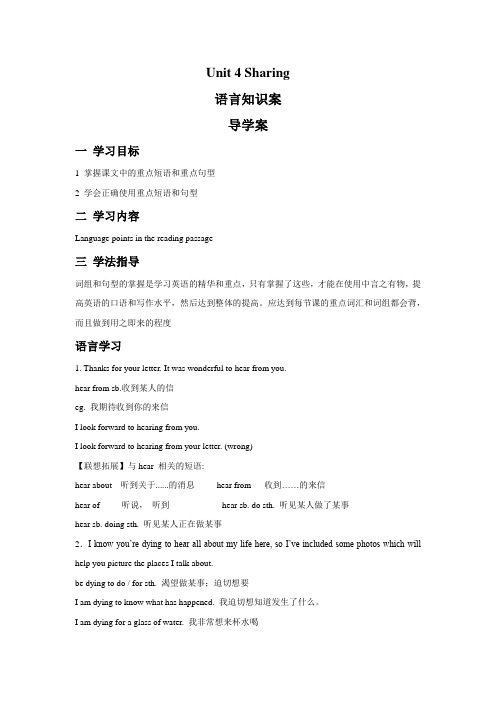
Unit 4 Sharing语言知识案导学案一学习目标1 掌握课文中的重点短语和重点句型2 学会正确使用重点短语和句型二学习内容Language points in the reading passage三学法指导词组和句型的掌握是学习英语的精华和重点,只有掌握了这些,才能在使用中言之有物,提高英语的口语和写作水平,然后达到整体的提高。
应达到每节课的重点词汇和词组都会背,而且做到用之即来的程度语言学习1. Thanks for your letter. It was wonderful to hear from you.hear from sb.收到某人的信eg. 我期待收到你的来信I look forward to hearing from you.I look forward to hearing from your letter. (wrong)【联想拓展】与hear 相关的短语:hear about 听到关于......的消息hear from 收到……的来信hear of 听说,听到hear sb. do sth. 听见某人做了某事hear sb. doing sth. 听见某人正在做某事2.I know you’re dying to hear all about my life here, so I’ve included some photos which will help you picture the places I talk about.be dying to do / for sth. 渴望做某事;迫切想要I am dying to know what has happened. 我迫切想知道发生了什么。
I am dying for a glass of water. 我非常想来杯水喝(1) 我极想出国___________________________________________________________(2) 他很渴望喝点酒_______________________________________________________【联想拓展】“渴望”的类似说法(1) have a strong desire for sth.(2) be eager to do(3) be thirsty for sth.(4) desire to do sth.(5) long to do sth. / for sth.单项选择:Smallpox(天花), a kind of disease, has now died______.A. outB. awayC. offD. down3. Sometimes I wonder how relevant chemistry is to these students,most of whom will be going back to their villages after Year 8 anyway.relevant adj. 有关的,相关的;切题的What you said is not relevant to the matter in hand.你所说的事与目前考虑中的问题无关。
高中英语 Unit 4 Sharing 语言知识导学案 新人教版选修7
高中英语 Unit 4 Sharing 语言知识导学案新人教版选修7Unit4 Sharing 语言知识导学案新人教版选修7一学习目标:1 掌握课文中的重点短语和重点句型2 学会正确使用重点短语和句型二学习内容:language points in the reading passage三学法指导:词组和句型的掌握是学习英语的精华和重点,只有掌握了这些,才能在使用中言之有物,提高英语的口语和写作水平,然后达到整体的提高。
应达到每节课的重点词汇和词组都会背,而且做到用之即来的程度语言学习1、Thanks for your letter、 It was wonderful to hear from you、 hear from sb、收到某人的信eg、我期待收到你的来信I look forward to hearing from you、I look forward to hearing from your letter、(wrong)【联想拓展】与hear 相关的短语:hear about 听到关于、、、、、、的消息 hear from 收到……的来信hear of 听说, 听到 hear sb、do sth、听见某人做了某事hear sb、 doing sth、听见某人正在做某事2、I know you’re dying to hear all about my life here, so I’ve included some photos which will help you picture the places I talk about、be dying to do / for sth、渴望做某事;迫切想要I am dying to know what has happened、我迫切想知道发生了什么。
I am dying for a glass of water、我非常想来杯水喝(1)我极想出国_________________________________________________________ __(2)他很渴望喝点酒_______________________________________________________ 【联想拓展】“渴望”的类似说法(1) have a strong desire for sth、(2) be eager to do(3) be thirsty for sth、(4) desire to do sth、(5) long to do sth、 / for sth、单项选择:Smallpox(天花), a kind of disease, has now died______、、A、 outB、 awayC、 offD、 down3、 Sometimes I wonder how relevant chemistry is to these students, most of whom will be going back to their villages after Year8 anyway、relevant adj、有关的,相关的;切题的What you said is not relevant to the matter in hand、你所说的事与目前考虑中的问题无关。
高中英语Unit4SharingSectionⅢGrammar——限制性定语从句教案(含解析)新人教版选修7
Section ⅢGrammar——限制性定语从句一、定语从句的相关概念1.定语从句在复合句中作定语修饰主句中某一名词或代词的从句叫定语从句。
2.先行词被定语从句修饰的词叫先行词。
3.关系词引导定语从句的词叫关系词。
关系词分为关系代词(that,which,who,whom,whose,as等)和关系副词(when,where,why等)两类。
关系词通常有三个作用:(1)连接定语从句;(2)指代先行词;(3)在定语从句中充当一个句子成分。
4.限制性定语从句用来修饰和限制先行词,与先行词之间的关系非常密切,它所修饰的先行词代表一个(些)或一类特指的人或物,说明先行词的性质、身份、特征等状况,如果去掉,则意思含混不清。
She is the girl that you want to know.(限制性定语从句)她是你想认识的女孩。
He seems not to have grasped what I meant,which greatly upsets me.(非限制性定语从句)他似乎没理解我的意思,这使我很心烦。
[即时训练1] 用适当的关系词填空①The exact year which/that Angela and her family spent together in China was 2017.②The little girl that/whom/who I spoke to just now is my sister.二、关系代词的基本用法我们昨天拜访的那位老人是位著名的艺术家。
Miss Wang is taking care of the child whose parents have gone to Beijing.王小姐正在照顾一个父母去了北京的小孩。
This is the textbook (that /which) he is looking for.这就是他正在找的课本。
陕西省榆林育才中学高中英语 Unit 4 Sharing 写作导学案 新人教版选修7
陕西省榆林育才中学高中英语 Unit 4 Sharing 写作导学案新人教版选修7学习目标:通过对本单元单词、短语、句型的进一步学习,逐步掌握字词句的用法。
学习内容:复习本单元主要词汇、语法,通过掌握的知识组织一段文字。
第一部分自主学习词汇串记:同学们根据下文内容,完成英文段落的空白部分。
不久前的一天,我收到朋友李扬的来信。
他现在在西藏当志愿者老师。
这封航空信件用了大约两星期的时间才到我手里。
那里发生了暴风雪,否则它早就到了。
李阳说她现在住在一个偏僻的村里了,条件相当差。
没有课本的孩子们在一间屋顶有一个大洞的教室里学习。
起初,她无法忍受这里的条件,但后来她适应了。
河里的水干了,李阳不得不沿着一条满是杂草的小路用桶去挑水喝。
尽管贫穷和困难,孩子们却非常渴望知识,他们梦想着能当翻译过宇航员。
李阳除了教给他们基本的知识外,还叫他们一些相关的经济或金融知识。
她甚至还跟他们讨论政治的问题。
每天,李阳都做很多文书工作,还要为第二天的工作做好安排。
她很累,但感到很高兴。
李阳建议我加入一个志愿组织,参加一些活动帮助那些处于困境的人。
我可以买一些书或电脑捐给那些贫穷的孩子。
她可以带我分发给他们。
她还说帮助他们不是某个人的特权,这需要每个人的努力。
最后,她邀请我明年夏天去西藏做一些实际工作。
也许我可以开一个临时诊所为那里的人们治病。
____ _____ _____I_____ _______ my friend, Li Yang, working in Tibet as a volunteer teacher, It took about a________ for this ________ letter to reach me .A snowstorm happened there, _______ it would have reached me earlier.Li Yang says is now living in a _______ village. The condition is very poor. Children with no_______ study in classroom whose_______ has a big hole. At first, she couldn’t stand it, and late she_______ ___ it. The river has _________ and Li Yang has to carry the water with_______ along a path with______. Despite poverty and difficulties, children ___________learn __________knowledge and dream of being an ___________ or _________ . Li Yang teaches them some_________ and __________ knowledge besides basic knowledge. She also discusses ________ problems with them. Every day Li Yang does much__________ and makes _______________ for next day. Shefeels tired but happy.She also advises me to join a voluntary organization to __________ in activities to help those ___________. I can___________ some books and computers to _______ those poor-children, She will help me _________ them. She also says it isn’t someone’s _________ to help them. It needs everyone’s efforts. In the end, Li Yang invites me next summer to Tibet to do some practical work. Maybe I can ________ a temporary _____ to treat the disease for people there.第二部分写作训练用本单元所学词组、句型翻译下列短文亲爱的王平,你好!很高兴收到你的来信。
选修7-Unit-4《Sharing》第一导学案
人教新课标选修7 Unit 4《Sharing》教学案单元要点预览教材分析本单元的话题是Sharing,主要涉及帮助弱者、志愿服务、合作分享等。
通过听、说、读、写等各种活动学习相关的语言知识,使学生了解世界上很多地方依然很落后,从而懂得同情,学会分享。
了解一些志愿者工作的信息,培养学生互助合作的精神和社会责任感。
结合针对短文话题的探讨激发学生的国际意识,通过各种渠道力所能及地为贫困地区的孩子作出自己的贡献。
WarmingUp部分是一个调查,分成三项任务:首先回顾自己曾经做过的助人为乐的好事,并采访三位同学;然后,根据调查内容列举班级同学所做的好事;最后讨论volunteer的内涵。
通过这些任务,让学生懂得什么是“帮助”,反思自己是否乐于助人,以及怎样做才是“志愿者”,由此为后面的短文学习做好铺垫。
Pre-reading是Reading的热身活动。
交代了阅读文章的文体(letter)和作者(a young Australian woman,Jo),还根据她在PNG拍的10张照片提出了5个问题,回答这些问题有助于学生加深理解“志愿者活动”的意义。
Reading是一篇Jo写给Rosemary的信。
其中介绍Jo在PNG(PapuaNewGuinea)的一个小山村教书。
在她写给Rosemary的信中,作者描述了该村学校的情况和去一个学生家做客的经历,使学生感受到PNG的儿童生活处境的艰难,更加珍惜自己的学习机会。
Comprehending是根据短文设计的阅读理解试题。
第一个练习要求学生读懂书信的内容,用表格的形式帮助学生整理书信中提到的关于巴布亚新几内亚村落生活及风俗习惯的信息,属于细节题。
第二个练习要求学生对文中提到的五个现象进行分析,说明原因,属于细节推理题。
第三个练习要求学生通过阅读分析生活在小山村中的积极面和消极面,这个练习进一步地开阔学生的思维,使学生对艰苦的生活有更深的理解。
第四个练习要求学生小组活动,讨论四个问题,进一步巩固学生对于课文内容的理解,并且让学生联系自己的实际情况,通过比较校舍、教学条件、生活状况等方面的问题,引发学生的深层思考,谈谈自己是否愿意参加志愿者活动。
- 1、下载文档前请自行甄别文档内容的完整性,平台不提供额外的编辑、内容补充、找答案等附加服务。
- 2、"仅部分预览"的文档,不可在线预览部分如存在完整性等问题,可反馈申请退款(可完整预览的文档不适用该条件!)。
- 3、如文档侵犯您的权益,请联系客服反馈,我们会尽快为您处理(人工客服工作时间:9:00-18:30)。
陕西省榆林育才中学高中英语Unit 4 Sharing 语法导学案新人教版选修7教学目标:1、复习定语从句(The attributive clause)2、正确使用关系代词和关系副词课前练习1. Fill in the blanks using that / which / whose1.This is the ship _________ name is also Titanic .2.Titanic is the ship _______________ sank after hitting an iceberg in 1894.3.Titanic is the ship ______________ a terrible disaster happened to.4.Titanic is the ship to ___________ a terrible disaster happened.2. Combine each pair of sentences using when / where.I was born in Shanghai. Shanghai is a beautiful city.Shanghai, ______/________ I was born, is a beautiful city.I still remember the day. I first came to the school on the day.I still remember the day _______/__________I first came to the school.自主学习定语从句一般都紧跟在它所修饰的词后面。
被定语从句所修饰的名词或代词叫做“先行词”。
引导定语从句的词叫“关系词”。
关系词有两个作用:1.引导定语从句。
2.代替先行词在其引导的定语从句中充当一定的句子成分。
关系词作用成分whichthatwhowhomwhenwherewhy重点一:用“代入法”解析定语从句,大概有如下几个步骤:1:通读全句,找出先行词:(即定语从句所修饰的词)。
2:判定先行词的属性:是人,是物,还是人物皆有。
3:把先行词代入后面的定语从句中,分析其所作成分。
4:确定引导词。
注意:四个步骤中,第三点中的“分析成分” 就是解释并确定定语从句的引导词的关键Example:★1949 was the year ______ New China was founded.★1949 was the year ____________ the Chinese people can’t forget.第一步:确定先行词:两句话的先行词皆为the year第二步:判定先行词的属性,是物,(先排除who, whom的可能性)第三步:把先行词代入定语从句中:★New China was founded the year 1949.(in the year 1949)时间状语The Chinese people can’t forget the year 1949.(宾语)第四步:确定引导词。
重点二:关系代词的用法注意事项:1.只用that的情况①先行词是不定代词(如:all, everything, nothing, anything, little, much, few等)或先行词被all, only, every, no, some, any, little, few, very(恰好,正是)等修饰时。
Eg:Everything that can be done is done.He is the very man that they are looking for.②在there be句型中。
There’s still a seat that is still free in the corner.③先行词既有人又有物时。
He talked about the teachers and schools that he had visited.④先行词是序数词,形容词的最高级或被序数词,形容词的最高级(包括first, last)修饰时。
The first thing that we should do is to work out a plan.This is the best book that I have read this year.⑤系代词在定语从句中作表语时。
Our village is no longer the place that it used to be.⑥主句是以who / which开头的特殊疑问句或先行词是疑问代词who时(以免重复)。
Which is the room that Mr. Wang lives in?Who that has seen his works doesn’t admire him?⑦被same修饰的先行词后可用that而不用which.Yesterday I met the same scientist that you met last year.2.不用that的情况①引导词在定语从句中作介词宾语且置于该介词之后时,先行词如果是人用whom,先行词如果是物则用which,(介词后的关系词不可以省略)。
The person at whom the boys are laughing is my brother.The room in which we live is very clean.说明: 将介词移至定语从句中或句尾时,whom可换用who或that也可省去;which可换用that也可省去。
The person (whom / that )the boys are laughing at is my brother.The room (which / that)we live in is very clean.在非限制性定语从句中The sun, which is very hot, gives a lot of energy to man.③先行词是that时(以免重复)What’s that which is moving on the table?先行词为those, he, she, anyone 等代词表“人” 时,关系代词用who,一般不用thatThose who want to go there must be at the school gate by 7:00 p.m.He who doesn’t reach the Great Wall is not a true man。
whose注意:whose只用作定语,既可以用来指人,也可以用来指物。
指物时可与of which结构互换,但词序不同。
whose+名词=the+名词+of which=of which+the+名词Thehouse_________________________/_________________________/_____________isbroken is mine.(窗户破了的房子是我的)关系副词的用法1. 关系副词和先行词的关系(关系副词实际上是介词+先行词)I still remember the day when I came here. When=_________________This is the house where I lived last year. Where=_____________________There are many reasons why people like traveling. Why=________________________注意:Can you think of a situation _______ you can use the word?归纳:先行词为situation, case, point 时,使用where.介词+关系代词的特殊情况:介词能提前吗?Is this the watch that you are looking for?The old man whom I am looking after is better注意:在固定短语中介词不能提前:care for, call on, put off, listen to, look for, look after……as 引导的限制性定语从句(1)This is the same book as I lost._____________________________________This is the same book that I lost._______________________________________as 引导的限制性定语从句(2)(1)This is such an interesting book as we all like.This is so interesting a book as we all like.(2)This is such an interesting book as we all like it.This is so interesting a book as we all like it.非限制性定语从句中as与which的区别:as ,which均可引导非限制性定语从句, as 引导的从句可以放在句首、句中、句末;而which只能位于主句之后。
Yo u always work hard, as / which everyone knows.As is known to all, China is the country with largest population in the world.此外,as有“如…,正象…”之意,与之连用的词有know, see, expect, announce, point out等,常用被动结构如as is announced;as is reported;as is expected;as has been explained;as is mentioned above; as is known to all/ as we all know补充:★ who, whom, whose 也可以引导非限制性定语从句。
Bob’s father, who worked on the project, spent four years in Egypt.He spoke of a pen-friend, the name of whom / whose name I’ve never forgotten.★ when,where ,介词+which 也可以引导非限制性定语从句。
